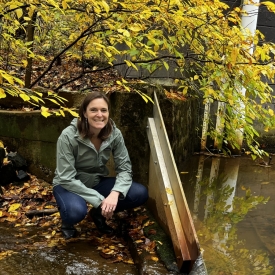Principal Investigator
Our research addresses the interface between biogeochemistry, hydrology, and social processes in aquatic ecosystems. Current research addresses three themes, and includes both local and multi-site comparative projects to address these questions.
1) Biogeochemistry of urban social-ecological systems
Urbanization alters elemental inputs, environmental conditions for their transformations, and hydrologic flowpaths that control material transport. Our research in urban biogeochemistry addresses two questions: 1) How does urban design affect nutrient and organic carbon fluxes from urban watersheds, and 2) What are the social processes underlying changes in urban design over space and time?
How does urban design affect nutrient and organic carbon fluxes from urban watersheds?
- Stormwater infrastructure design (Hale et al. 2014, 2015, Macek, Hale, and Baxter 2020)
- Density and diversity of urban vegetation (Hill et al. 2021)
- Urban stream metabolism (Gauthier MS research, Blinn PhD research)
- NSF Award: Collaborative Research: Scales and drivers of variability in dissolved organic carbon across diverse urban watersheds (several manuscripts in review and prep)
What are the social processes underlying changes in urban design over space and time?
- Stormwater management paradigm shifts over time (Hale et al 2014, Hale 2016)
2) Biogeochemical consequences of streamflow intermittence
Most of what we know about stream ecosystem ecology and biogeochemistry is from research in perennially flowing systems. Yet more than half of all streams experience flow intermittence, especially in dryland regions, and these streams are likely to have different patterns of and controls on ecosystem processes. A major question in our research program is: How does spatiotemporal variation in streamflow intermittence affect ecosystem processes?
- Sources, transformation, and transport of carbon (Hale and Godsey 2019, Hale et al. in press)
- NSF Award: Network-scale streamflow intermittence controls on dissolved organic carbon concentrations and processes
- NSF EPSCoR Track II Aquatic Intermittency effects on Microbiomes in Streams (AIMS) project
- Rhode River Stream Monitoring program






